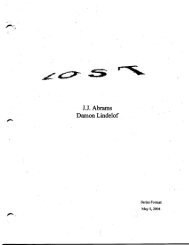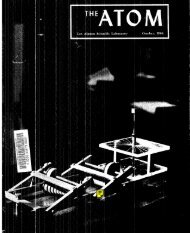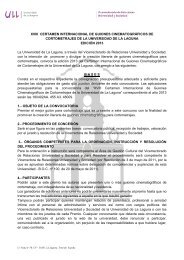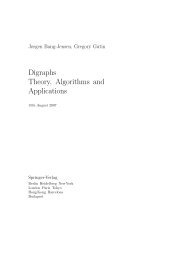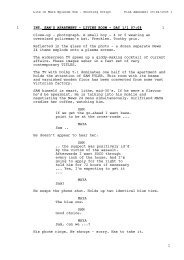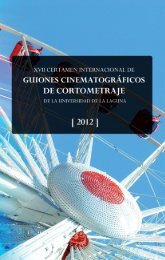Create successful ePaper yourself
Turn your PDF publications into a flip-book with our unique Google optimized e-Paper software.
PUBLISHER'S<br />
PAGE<br />
Ailicipalinu lutut'E lhinus<br />
Some thoughts on science education in 2044<br />
S WE CELEBRATE THE soth<br />
Anniversary of the National<br />
Science Teachers Association,<br />
our thoughts naturally turn to<br />
the future. What will science education<br />
be like 50 years from now?<br />
What will the chronicle of NSTA's<br />
hrsthundredyears have to say about<br />
the period 1995-2044? While it may<br />
be folly to prognosticate, we cannot<br />
iunction as educators without a vision<br />
of the future. What happens in<br />
classrooms fifty years hence will<br />
depend on what we do today. So this<br />
rs a good opportunity to restate our<br />
goals for science education, and to<br />
take stock of science and society, as<br />
we enter the 21st century.<br />
I believe that science itself-its<br />
basic concepts, principles, empirical<br />
laws, and fundamental theorieswill<br />
change very little in the next<br />
fifty years. Scientific advances are<br />
slow compared to the pace of technological<br />
innovation. Science educators<br />
will take a great step forward<br />
when they learn to distinguish between<br />
science and technology, yet<br />
are able to use technology to teach<br />
science. The confusion of the two<br />
has long been with us. In 1883<br />
Henry Augustus Rowland, addressing<br />
the American Association for<br />
the Advancement of Science, said<br />
"the proper course of one in my position<br />
is to consider what must be<br />
done to create a science of physics in<br />
the country , rather than to call telegrams/<br />
electric lights, and such conveniences<br />
by the name of science."<br />
While interactive CD-ROM and<br />
powerful computers (not to mention<br />
electric lights) are not science per se,<br />
they can be very useful in the classroom,<br />
freeing up the teacher to teach<br />
and motivating students to learn<br />
science based on relevance.<br />
What are the most important<br />
things young people in the 2lst century<br />
will learn from science? The<br />
same things they shouldbe learning<br />
today (only more so). First and foremost,<br />
they will still need to learn<br />
facts, names, definitions/ concepts/<br />
empirical laws, theories, models,<br />
and universal laws of science, and to<br />
keep them from turning into one<br />
another (the "Law of Relativity,"<br />
the "Theory of Universal Gravitation").<br />
They will learn about countless<br />
applications of scientific principles<br />
to meet human needs or solve<br />
societal problems, without losing<br />
sight of the basic science. Second,<br />
they will understand that what<br />
makes a certain kind of activity science<br />
is its ability to predict. It is not<br />
enough to explain what happenedscience<br />
must be able to say whatwill<br />
happen. Students will leam that in a<br />
true science, someone's explanation<br />
of a phenomenon is acceptable only<br />
if independent investigators can<br />
verify empirical facts or reproduce<br />
experimental results. Third, students<br />
will learn how to learn. In<br />
school they will discover reasons to<br />
keep educating themselves about<br />
science for the rest of their lives,<br />
and they will have picked up the intellectual<br />
tools required to do it.<br />
Fourth, they will develop a keen<br />
sense of skepticism. They will carefully<br />
examine statements from "authorities,"<br />
whether they are the<br />
world's leading scientists, politicians,<br />
or clerics. They will draw on<br />
their own reasoning abiiity and scientific<br />
training to study issues and<br />
come to their own conclusions.<br />
How will students acquire these<br />
abilities? Not by burrowing in a<br />
textbook. Not by listening to a<br />
teacher. Not by watching a video, no<br />
matter how well produced, in which<br />
every step in the development of a<br />
particular concept is explained with<br />
the greatest clarity. Not even by interacting<br />
with af"ancy computer system<br />
that provides continuous feedback<br />
and monitors the student's<br />
progress. They will acquire these<br />
abilities by arduous concentration<br />
and hard work motivated by their<br />
desire to learn some basic aspect of<br />
science for reasons that are entirely<br />
their own. They must be guided to<br />
the science thatthey find essential,<br />
some piece of apuzzle of their own<br />
devising.<br />
These plzles and problems will<br />
be so varied that no classroom situation<br />
or "cooperative group" with a<br />
JUI.Y/AUTtlSI ISS4



